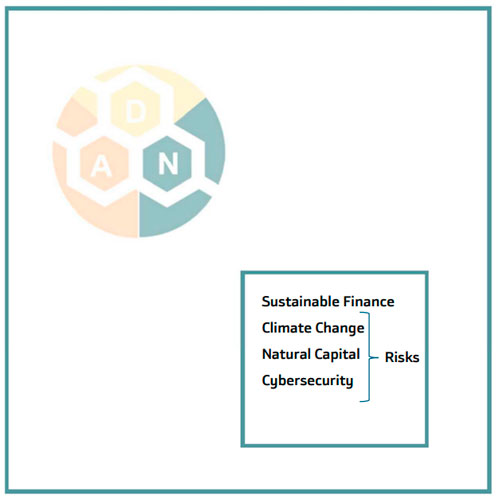We use first and third-party cookies for analytical and statistical purposes and to show you personalised advertisements based on a profile compiled from your browsing habits (e.g. pages visited). For more information, click on our Cookie Policy. You can accept all cookies by pressing 'Accept', you can reject all cookies by pressing 'Reject', or you can customize your choice by pressing 'Manage'.
Sustainable Business
This pillar focuses on addressing its strategic lines considering both risks, including Climate Change, negative impacts on Natural Capital, and Cybersecurity, among others, as well as the opportunities of sustainable business. Bankinter maintains a firm commitment to managing its operations in a socially and environmentally respectful manner, assuming the challenge and responsibility of mitigating its direct and indirect impact. We recognize the fundamental role of the financial sector as a facilitator of resources towards various economic activities, with the ability to direct capital flows towards initiatives that promote a transition to a more sustainable, green, and inclusive economic model. Therefore, in this plan, Bankinter prioritizes increasing the volume and diversification of sustainable products, aware of the opportunity that this transition represents for both the business and our clients.

To ensure compliance with the principles contained in its environmental policy, and as such with continuous improvement of its environmental performance, Bankinter has implemented an Environmental Management System which has been certified in accordance with the UNE-EN ISO 14001 standard, in the Bank's major Madrid centres, the head office on Paseo de la Castellana, Tres Cantos, Alcobendas 12 and 14, Barcelona main branch, Bilbao main branch, Valencia main branch and in the Sustainable branch.
Risks of Climate Change and Risks to Natural Capital
Bankinter maintains a firm commitment to addressing its environmental management by taking on the challenge and responsibility of operating in the most environmentally respectful manner, taking necessary measures to mitigate its direct and indirect environmental impact, following the precautionary principle.
To achieve this, it relies on the principle of prevention, analyzing and managing its main environmental risks throughout its value chain, both the direct ones related to the properties where its staff works, as well as the indirect ones derived from its activity. The entity's Environmental Policy is aimed at enhancing the positive effects and minimizing the negative ones that its activity may generate on the environment.
The Sustainability department, along with the bank's Sustainability Committee, ensures compliance with the principles that govern this policy and ensures the entity's commitment to environmental protection.
Strategy for climate change
As a financial entity concerned with, and committed to, fighting climate change and the deterioration of natural capital, Bankinter has undertaken the challenge to create a corporate climate change and natural capital strategy. Bankinter has been working on a strategy to identify and mitigate risks associated with climate change and support initiatives in favour of fairer and more sustainable social and environmental development for people and the planet.
This strategy has a risk and opportunities analysis for the banking and finance sector in order to meet the challenge of transforming society and transitioning the current economic and production model to a new production model in line with sustainable development targets and the international agenda for ecological transition. Bankinter has already joined other entities that have voiced their support for the recommendations of the Task Force on Climate-Related Financial Disclosures, in order to include climate change within its management of risks and opportunities.

The Climate Change and Natural Capital Strategy focuses on:
Climate commitment
Contributing to the transition towards a sustainable economy to help adapt to and mitigate the effects of climate change.
Bankinter is a member of the Net Zero Banking Alliance initiative with the aim of achieving carbon neutral emissions by 2050.
Business opportunities
Expand operations relating to sustainable finances, by creating products related to all the bank's areas of activity (savings, investment, credit, management and/or payment products).Risk management
Full integration of climate change risk management into the risk management model, design of a decarbonisation roadmap for investment and financing portfolios.Stakeholder engagement
Involvement of all stakeholders in the collective commitment to action on climate change.Bankinter Green Bond Framework and Report
Information relating Bankinter Green Bond Framework and Green Bond Report.
BANKINTER GREEN BOND FRAMEWORK
BANKINTER GREEN BOND FRAMEWORK SECOND PARTY OPINION
BANKINTER GREEN BOND FAMEWORK PRESENTATION
BANKINTER 2020 GREEN BOND REPORT
Bankinter 2021 Green Bond Report


Carbon Footprint Management
Bankinter controls the emissions of CO2 and other greenhouse gases deriving from its activity by calculating its overall carbon footprint, with a view to be able to take the necessary measures to mitigate its contribution to climate change.
Bankinter has been calculating its carbon footprint since 2007. With this global analysis of emissions (direct, indirect and induced), the Bank is preparing ahead of time for the initiatives of the European Commission and the Spanish government in their proposals that companies should report emission data beyond Scope 1 (direct emissions).
The environmental footprint is calculated and verified annually by an independent certifying agency in accordance with the UNE EN ISO 14064 carbon footprint standard.
The Bank has also calculated the carbon footprint associated with the use of channels of communication, with a view to promoting the use of the most eco-efficient channels.
| Name | Link to document |
| Carbon footprint report 2022 Bankinter España (in Spanish) | See document See document |
| GHG emissions Statement 2022 Bankinter España (in Spanish) | See document See document |
| Informe de Huella de Carbono 2022 Bankinter Portugal (portugués) | See document See document |
| GHG emissions Statement 2022 Bankinter Portugal (in Portuguese) | See document See document |
Indirect environmental impacts management
Bankinter has been the only Spanish bank (8 banks at international level) that has participated with a pilot project to develop a specific guide for the financial sector to help the impacts on natural capital to be identified and managed , with the Natural Capital Coalition (an initiative driven by the United Nations Environment Programme). This project will show:
- - The environmental impact of the bank investment policies in relation to natural capital, not only in terms of emissions, but also of the impact on terrestrial and marine biodiversity, and on natural resources (such as water and land use).
- - The weight and risk of each of the sectors in whicht the bank invests, with respect to future regulations.


Biodiversity
Bankinter forms part of the "Business and Biodiversity" working group of financial institutions and biodiversity to keep abreast of best practices in relation to these aspects. Bankinter has also signed up to the "Financial Commitment to Biodiversity", and is one of the 26 institutions that made this commitment, the only one in Spain
Cybersecurity Risks
Bankinter views digital security as a fundamental priority in response to the increasing technological risks stemming from the ongoing digitization in financial services and the growth of organized cybercrime. The bank is committed to ensuring optimal levels of confidentiality, integrity, and availability for its clients, employees, shareholders, and suppliers. To achieve this, it implements digital security and information strategies, increasing budget allocations and dedicated personnel in these areas.
Bankinter has made notable advancements in security projects and internal processes, including improvements in business continuity and protections against threats such as DDoS and Ransomware. Additionally, security certifications ISO 27001 and ISO 22301 have been renewed. The entity also conducts awareness and training programs for internal and external users, including simulation exercises and awareness campaigns. A Cyber Intelligence service has been implemented to detect early threats, and a Modern SOC (Security Operations Center) has been established to proactively manage security incidents 24/7.
The growing importance of digital security is emphasized considering the expansion of cybercrime, which poses a significant threat to financial institutions due to their constant interaction with the public and the unique characteristics of their business.

Sustainable Finance

In the corporate sphere
Bankinter stands out for offering a variety of financial products with sustainability and social responsibility criteria, including:
1. Green and sustainability-linked loans: Bankinter offers loans to finance activities with a positive environmental impact, according to international standards such as the "Green Loan Principles." Additionally, it provides sustainability-linked loans based on the company's global strategy for sustainable development and compliance with environmental, social, and governance (ESG) objectives.2. Renewable energy financing: The bank provides financing for the renewable energy sector, representing a significant portion of its risk portfolio in the electricity and gas sector.
3. Green bonds: Bankinter issues green bonds that finance projects with a positive environmental impact, such as reducing CO2 emissions. These bonds are backed by a framework agreement and validated by Sustainalytics.
4. Alternative investment vehicles with ESG criteria: Bankinter Investment manages alternative investment funds with a focus on sustainability, investing in renewable energies, infrastructure with a positive environmental impact, and projects aligned with European environmental initiatives.
5. Green Hydrogen financing agreements: Bankinter has signed agreements to facilitate access to financing for projects related to the production, commercialization, or distribution of green hydrogen as a sustainable energy source.

In the retail sector
Bankinter offers a range of sustainable financial products, including:
1. Sustainable investment funds and pensions: It offers its own and third-party investment funds qualified as sustainable, as well as pension plans managed with sustainability criteria.2. Mortgages and energy efficiency financing: It provides mortgages for highly efficient homes and finances energy efficiency activities in community properties.
3. Financial inclusion products: Bankinter offers financial products designed for specific groups, such as the Mini Account and Youth Account, as well as mortgages and rental plans aimed at young people.